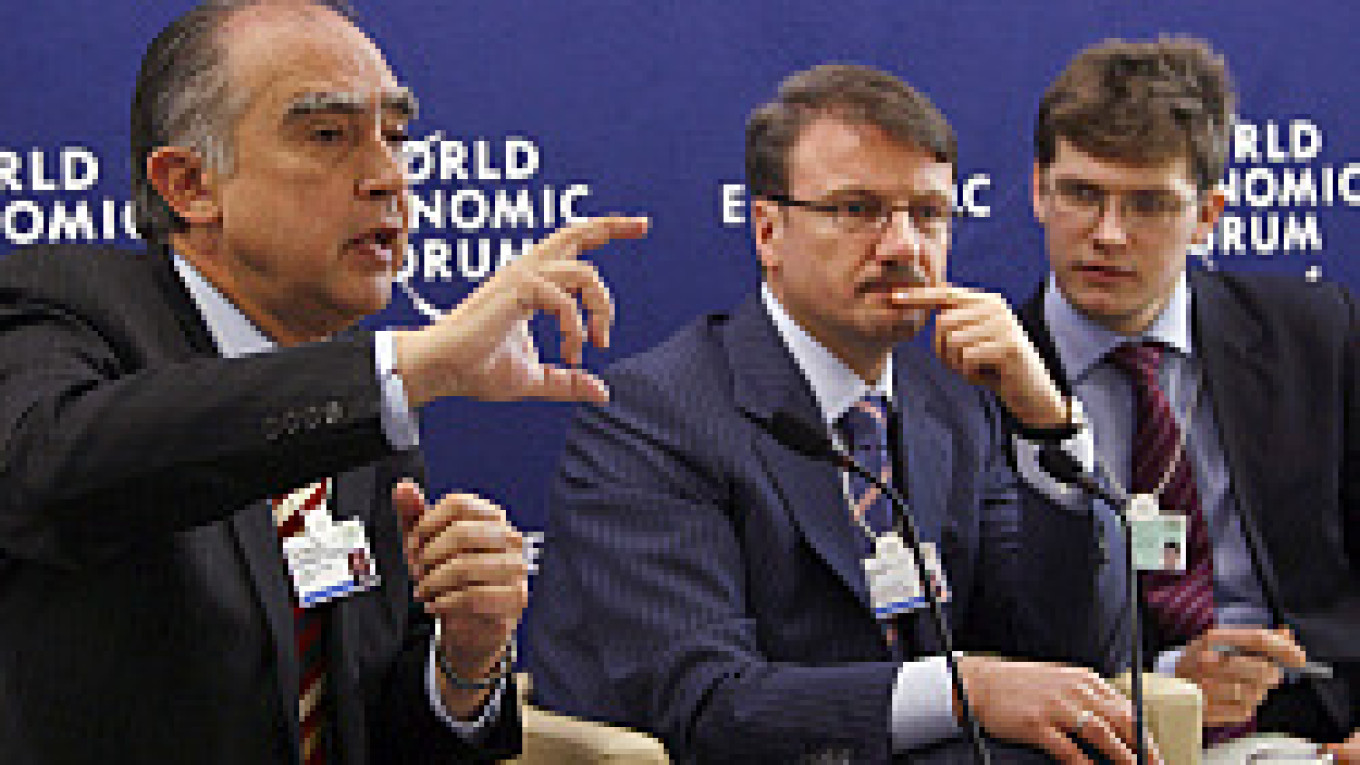These discussions, sometimes over lunch or dinner, bring together people who might otherwise never meet. And sometimes they encourage people with low public profiles but high-impact jobs to express their ideas. The results are often surprising, which presumably is the point of the whole expensive exercise.
But for people from our part of the world, two events this weekend in Davos stood out.
On Friday, Viktor Pinchuk, a Ukrainian billionaire on the losing side of the Orange Revolution, put on a private lunch with such an assortment of guests and speakers that you wondered how he got them all into the same room.
With George Soros, Strobe Talbott and Pinchuk's wife, who is former President Leonid Kuchma's daughter, seated at the head table and some of Russia's biggest businessmen at the table all the way in the back, Pinchuk introduced the main speaker, former Polish President Aleksander Kwasniewski, and noted the important role he had played in "our Orange Revolution." Two Cabinet ministers from the ousted government joined the current economy minister and TNK-BP CEO Robert Dudley in making short remarks.
Then on Saturday morning, some of Russia's most successful young business leaders engaged in a lively discussion on Russia's future, at times taking opposing views.
The discussion on Saturday centered around three scenarios for Russia developed by the forum and presented by Angela Stent, a professor at Georgetown University who until recently was on the U.S. National Intelligence Council; Lilia Shevtsova, an expert on Kremlin politics from the Carnegie Moscow Center; and Olga Dergunova, chairman of Microsoft in Russia.
It fell to Dergunova to present the rosiest scenario, in which oil prices decline and in the ensuing turmoil an exceptionally wise president is democratically elected and implements a series of bold reforms.
Alexander Izosimov, CEO of VimpelCom, stood up to take issue with the premise that high oil prices are holding Russia back. He made the case that high oil prices bring a sense of stability, reduce the risk of borrowing money and thus allow other sectors that require significant outlays of capital, such as telecommunications, to grow.
"Look at the amount of money being borrowed in the West," Izosimov said, expanding on his remarks after the conclusion of the session, which like most sessions at Davos is off the record unless the speaker explicitly agrees to be quoted. "The accessibility of international money would not happen if Russia were not perceived as stable."
He was joined by Alexei Mordashov, head of Severstal, who said that in addition to creating stability, high oil prices generated demand and allowed for increases in public sector wages.
Dergunova shot back that their arguments were based on the notion that oil revenue was being distributed through society -- and indeed, the figures show a widening disparity between rich and poor in Russia.
This recalled a discussion the day before at a session on how countries should spend their oil revenues and the conclusion that rising prices carry very real dangers for petro-states such as Russia.
At the session, Ngozi Okonjo-Iweala, the finance minister of Nigeria, described an effort to fight her country's notorious corruption by publishing information in the newspapers on how the oil revenues are distributed. H.E. Sheikha Lubna Al Qasimi, the economy and planning minister of the United Arab Emirates, made the point that the oil industry does not produce jobs; it is what is done with the revenues that matters.
The arguments of these two accomplished, Western-educated women seemed to have given Dergunova food for thought. She said the problem in the Russian oil industry was that the surplus revenues were "badly managed, poorly distributed and there was no transparency.
"Revenue distribution creates room for corruption when there is no civil control," she said.
Economic Development and Trade Minister German Gref also participated in the Friday morning session on oil revenues, where he was asked to explain the gas dispute with Ukraine. He reiterated Gazprom's position that the demand for Ukraine to pay a higher price for gas was not based on politics and that the company had a responsibility to its shareholders to sell to all its customers at market prices. "I'll repeat that it relates not only to Ukraine, but in Ukraine, because of political developments, it was overpoliticized," Gref said.
The gas dispute was also a main topic of discussion at the lunch hosted by Pinchuk. Arseniy Yatsenyuk, the economy minister, reiterated that questions over the ownership of Rosukrenergo were the main stumbling block to the signing of a gas deal initialed on Jan. 4. The deal has a signing deadline of Feb. 1.
He said that under Ukrainian anti-monopoly legislation, before the joint venture could be registered, Rosukrenergo had to disclose information on its shareholders. Asked whether the Ukrainian government knew who owned Rosukrenergo, he said, "The minister of economy doesn't know."
He denied the Russian claim, repeated here by Gref, that Rosukrenergo was brought into the deal at the insistence of the Ukrainian side. "The Ukrainians say it was the Russians, the Russians say it was the Ukrainians."
He said he had met with Gref earlier Friday and on Thursday.
He predicted that President Vladimir Putin and President Viktor Yushchenko would have to step in to break the deadlock before Wednesday's deadline. "It depends on the political willingness, but probably the two presidents have to reconcile. They are the best negotiators."
Pinchuk's lunch was moved to a bigger restaurant because so many people wanted to come. Among the 100 guests were Soros, a financier who supported the Orange Revolution; Talbott, president of the Brookings Institution who was former U.S. President Bill Clinton's point man on Russia; and Jean Lemierre, president of the European Bank for Reconstruction and Development.
The Russia dinner that night, which was part of the official forum program and thus open to everyone, was less of a draw. There was an embarrassing number of empty seats at the tables.
 ? Dudley said TNK-BP, in addition to expanding in Ukraine, was showing its confidence in Russia by planning to increase its capital investment in Russia by another 30 percent this year, from just under $2 billion in 2005 to up to $2.5 billion. This was also part of its protection plan in a country where the state is increasingly jealous of its energy resources, he said.
? Dudley said TNK-BP, in addition to expanding in Ukraine, was showing its confidence in Russia by planning to increase its capital investment in Russia by another 30 percent this year, from just under $2 billion in 2005 to up to $2.5 billion. This was also part of its protection plan in a country where the state is increasingly jealous of its energy resources, he said."As long as we continue to do the things we said we'd do, which is continue to increase investment, bring lots and lots of new technology into the country through people and expertise, and put in place programs around developing people, training, and we're very, very open about what we do, I think we're a good citizen and I think the government looks at us that way," he said following the Ukrainian lunch.
"We're in competition with many other companies, including some state companies in the oil and gas industry, so there's a normal healthy competition," Dudley said. "But we do not feel pressure that makes me stay awake at night."
A Message from The Moscow Times:
Dear readers,
We are facing unprecedented challenges. Russia's Prosecutor General's Office has designated The Moscow Times as an "undesirable" organization, criminalizing our work and putting our staff at risk of prosecution. This follows our earlier unjust labeling as a "foreign agent."
These actions are direct attempts to silence independent journalism in Russia. The authorities claim our work "discredits the decisions of the Russian leadership." We see things differently: we strive to provide accurate, unbiased reporting on Russia.
We, the journalists of The Moscow Times, refuse to be silenced. But to continue our work, we need your help.
Your support, no matter how small, makes a world of difference. If you can, please support us monthly starting from just $2. It's quick to set up, and every contribution makes a significant impact.
By supporting The Moscow Times, you're defending open, independent journalism in the face of repression. Thank you for standing with us.
Remind me later.


